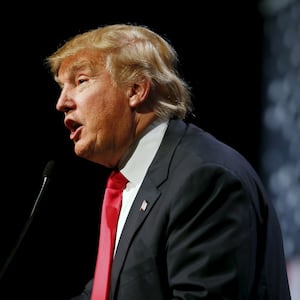Four decades before her attention to factual detail as the court-appointed monitor in the Trump fraud trial prompted his attorney to compare her to the obsessed fictional detective Javert from Les Miserables, Barbara Jones was the prosecutor in the real-life case involving the undercover FBI agent later played by Johnny Depp in the movie Donnie Brasco.
Retired agent Joe Pistone, who went by Donnie Brasco for six years while infiltrating the Bonanno crime family, has only good things to say about her.
“All I can tell you is she prepped me for all my cases in New York and she is straight, honest, direct,” Pistone told The Daily Beast on Tuesday. “She calls it as it is. She doesn’t try to bend the facts, or go around the facts. Whatever the facts are, that’s what she calls.”
Last week, in court papers related to the Trump case, here is how Jones called it: She said that while overseeing the Trump Organization’s financial reports, information supplied to her was “lacking in completeness and timeliness” and contained “errors and misstatements.”
Trump lawyer Clifford Robert fired back, suggesting that Jones was twisting the facts so she could stay on as monitor, enrich herself, and persecute the ex-president, whom he cast as the victim in his version of Les Miz.
That characterization does not ring true to Pistone, who said that while some prosecutors have been known to coach federal agents and other witnesses to shade their testimony to strengthen a case, Jones was not one to twist the truth—even under extreme pressure.
“We were going against the Mob,” Pistone said. “There was a lot hanging on it. We had to win that case.”
But Jones just played it straight.
“If what I had to say was detrimental to the government, it was OK with her,” Pistone recalled. “Barbara doesn’t take sides.”
Pisotne noted that she treated everyone as an equal even though she was the most senior member of the prosecution team. And, unlike so many prosecutors in other sensational cases that promised to generate bestselling books and big movies, Jones avoided press attention.
“She never wanted to step out and be in the spotlight,” Pistone said.

Former FBI agent Joe Pistone
Denise Truscello/GettyJones secured convictions against four of the five defendants and continued on her way to becoming known as one of the most dedicated and principled law enforcement officials in New York.
“Barbara Jones was not only one of my favorite prosecutors, she was one of my favorite people of all time,” FBI supervisor Jules Bonavolonta, who ran the Donnie Brasco case, later wrote in his book The Good Guys: How We Turned the FBI ’Round—and Finally Broke the Mob.
Two years later, then-U.S. Attorney Rudy Giuliani appointed her the head of the Organized Crime Strike Force, supervising 70 prosecutors and some 80 FBI agents.
“Ten or 15 years ago, there was no way in the world that a person in my position would be able to say ‘she’ when describing the head of a strike force,'' Giuliani was quoted saying at the time. '“She gets everyone’s respect because she can do all the things they do.”
In 1987, Jones became first assistant at the Manhattan district attorney’s office. She seemed a perfect choice when President Bill Clinton nominated her to the federal bench in 1995.
In 2005, she presided over the case of an $11 billion accounting fraud involving WorldCom and sentenced the CEO, Bernard Ebbers, to 25 years.
Jones’ most notable case was US v. Windsor in 2012. She ruled that the Defense of Marriage Act unconstitutionally barred same-sex couples from marrying—a decision affirmed by the U.S. Supreme Court .
“Judge Jones was somebody who looked at the law and the legal arguments and made a decision based on the law. And that’s exactly what you want a judge to do,” James Esseks, attorney for the American Civil Liberties Union, told USA Today in 2022.
After 16 years as a federal judge, Jones retired and entered private practice. Paul Shechtman, a prominent attorney and law professor who worked alongside her as both a state and federal prosecutor and in private practice, told The Daily Beast on Monday, “I’ve known Barbara Jones my entire professional life, and I share the view of every lawyer who has ever dealt with her that she is scrupulously ethical and fair-minded.”
In keeping with her stature, Jones has been appointed a special master in a series of high-profile cases in which she has sought no personal attention. One involved a 2018 search warrant served on Trump’s ex-fixer Michael Cohen. Another, in 2021, involved a search warrant served on her old boss, Giuliani.
Giuliani sought to bar prosecutors from obtaining some 96 cellphone messages on the grounds they were privileged. Jones decided that the government did not have a legal right to 40 of them.
Then, in November 2020, came a really big one. Manhattan Supreme Court Judge Arthur Engoron was worried that the Trump Organization might start moving money before judgment in a fraud case brought by New York Attorney General Letitia James. He asked both sides to propose possible monitors.
Jones was on both lists and the judge appointed her. She has been as fair as usual.
In her Jan. 26 letter to Engoron, Jones reported the lapses in transparency, yet added, “It is important to note that the Trump Organization acknowledged the disclosure issues described after I brought them to its attention.”
As reported by The Daily Beast, a footnote on page 8 of the letter addressed a $48 million loan that Trump has listed on financial disclosures. She said his company had confirmed the loan never existed, which experts told The Daily Beast raised questions about possible tax evasion.
Robert, the Trump lawyer, denied that anyone told Jones the loan was a fiction and accused her of engaging in “a demonstrable falsehood” and pursuing “some ‘Javert’ like quest.”
“The Monitor’s deliberate mischaracterization casts further doubt on her competency and veracity,” Robert contended.
No responsible party is on record casting any such doubt regarding Jones during her illustrious career.
“I’ve known Barbara since, what the hell, 1980, and that’s not her,” Pistone said on Monday. “You always can tell somebody when you’re in trial with them their true colors come out one way or the other.”
“She was always straight down the line.”








